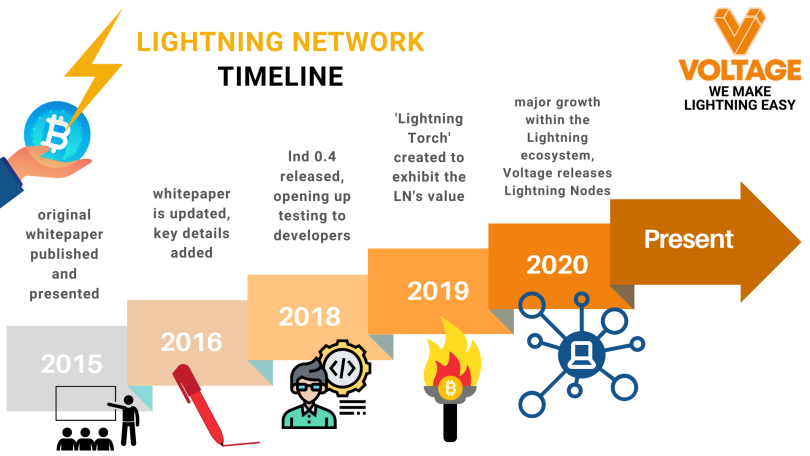“ ‘Scalability’ doesn’t refer to how easy it is to climb over your computer’s case" -Tom Webb
The Lightning Network was first conceived six years ago by Thaddeus Dryja and Joseph Poon as a solution to Bitcoin’s scaling constraints. While the Network still has a ways to go before it reaches its full potential, let's look back at just how far it has come in just over half a decade.
February 2015
Dryja and Poon release the first draft of the original Lightning Network whitepaper, version 0.5. On the first page of version 0.5 they outline concerns with Bitcoin’s ability to scale and support high volumes of transactions:
“The blockchain as a payment platform, by itself, cannot cover the world’s commerce anytime in the near future....The payment network Visa is believed to do 45,000 peak transactions per second on its network during holidays, and hundreds of millions average per day. Currently, Bitcoin supports around 7 transactions per second… If Bitcoin is to replace all electronic payments in the future, not just Visa, as currently implemented it can only achieve a small portion of that, or at best, scale with extreme centralization of a few capital-intensive Bitcoin nodes and miners.”
See the 22 page draft version 0.5 here
February 23rd, 2015
Joseph Poon and Thaddeus Dryja present at the SF Bitcoin Devs Seminar, believed to be the first public presentation of the Network. Around the 54 minute mark, Joseph Poon calls his shot on growing Bitcoin transaction fees- which has become a rather vocal pain point in the crypto community.
January 14th, 2016
An updated, more detailed version of the Original whitepaper is published.
See the 59 page, version 0.5.9.2
March 15th, 2018
Lightning Labs announces the initial release of lnd 0.4. This beta was created for developers to test out, and the network was even endorsed by Twitter’s CEO, Jack Dorsey around this time.
January 19th, 2019
The “Lightning Torch” was created to exhibit the value and capability of the Lightning Network. Participants connected via social media, and passed the “torch payment” to one another, adding 10,000 satoshis along the way. The torch was passed nearly 300 times in over 40 countries before being donated to a non-profit organization in Venezuela that promoted Bitcoin.
2020
Amid the pandemic and a rather turbulent 12 months, 2020 turned out to be a banner year for growth within the Network. Lightning Labs continued to roll out new versions of LND. Including features like Keysend, Wumbo Channels, and PSBT Support. Strike helped NFL star Russell Okung receive his salary in Bitcoin. Here at Voltage we launched our Lightning nodes platform that allows users to provision their own node faster than ever before! The list of accomplishments in 2020 is so vast it could be a post of its own.
February, 2021
Today, there are over 300 companies, projects, and apps that make up the Lightning ecosystem, as tens of millions of dollars in capital has been pumped into the space. The number of merchants that already accept LN payments is up to 400, and steadily climbs month over month.
For more info, check out this well written overview of the current state of the Lightning Network from Fulgar Ventures.
Join Us
The pace of growth and innovation in the Lightning Network is increasing with every month that goes by. Getting started with the Lightning Network has never been easier. Become a part of the Network today by provisioning your own node in under two minutes.

